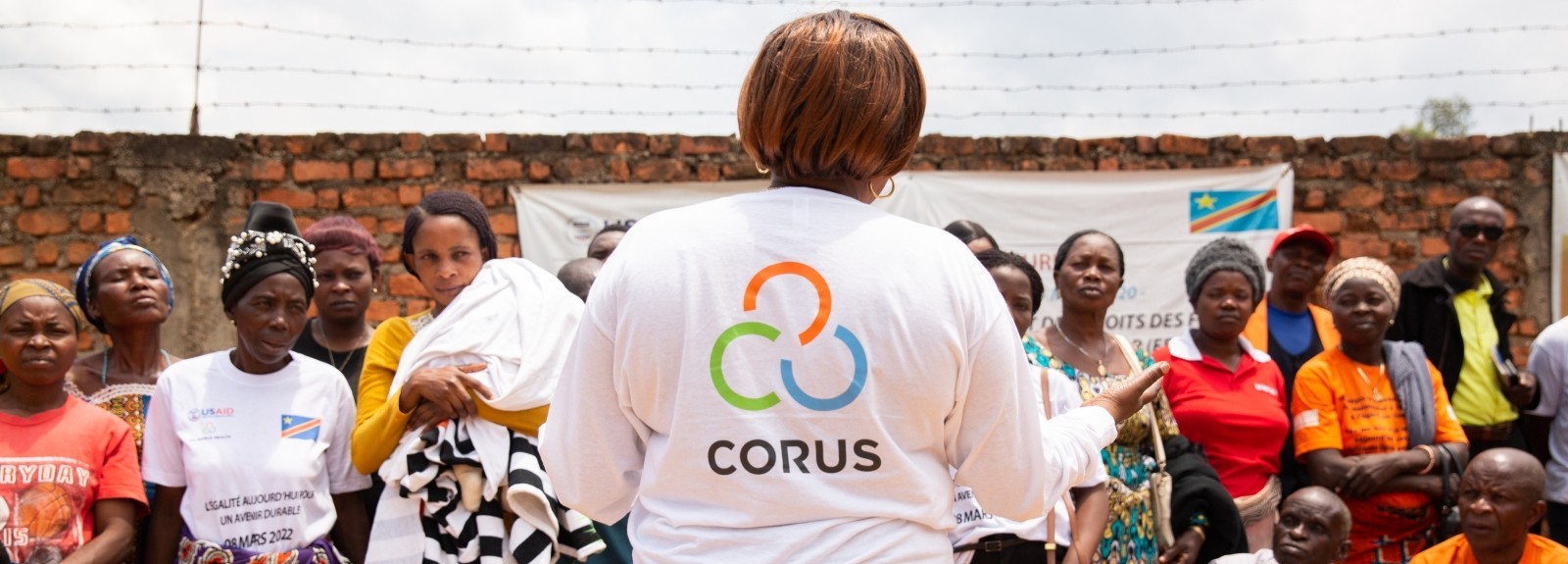Gender-based violence (GBV) is a global issue that demands localized solutions. Addressing GBV requires coordinated and sustained efforts from governments, civil society and health systems.
The Corus International family of organizations believes that strengthening local capacity is key to preventing, mitigating and responding to GBV. Here are four reasons why:
1. Local communities are best positioned to identify and address the root causes of GBV.
Communities have unique insights into the social, cultural and economic factors that contribute to GBV. They understand the local contexts and norms that may perpetuate violence and are in the best position to navigate the complex social dynamics that influence behavior change. By partnering with local leaders, we can leverage their credibility and authority to initiate community campaigns against GBV. Through workshops, training sessions and community dialogues, we support these leaders to become advocates for gender equality and agents of change within their communities.
SNAPSHOT: Through USAID-funded MOMENTUM Integrated Health Resilience, led by Corus organization IMA World Health, we partnered with local leaders in South Sudan to organize community dialogues and outreach efforts to combat GBV.
Khamisa John (right), a health worker trained by IMA World Health, accompanies a pregnant woman to a health clinic in South Sudan.
2. Context-specific strategies promote inclusion and safety.
Context-specific strategies grounded in local partnerships are essential to promoting inclusion and safety for all individuals. We work diligently to identify those who are most vulnerable to GBV, such as women and girls, persons with disabilities, LGBTQIA+ individuals and displaced populations. By recognizing their unique needs and challenges, we can tailor our interventions to provide targeted support that mitigates the risk of GBV and fosters equitable outcomes. We can ensure that our interventions against GBV are not only effective but also seamlessly integrated within the cultural and social fabric of the communities we serve by leveraging existing community and regional structures.
SNAPSHOT: Corus implemented a context-specific strategy to mitigate GBV in the wake of the complex humanitarian crisis that emerged from the 2022 Russian invasion of Ukraine. Working alongside local partners, we integrated sexual exploitation and abuse protection services at cash grant sites for Ukrainian internally displaced persons (IDPs) and led trainings for humanitarian staff on GBV prevention and inclusive program design.
Corus’ Ukraine GBV and protection expert, Tetyana Medvid, stands in front of our mobile medical unit where she supports doctors to identify signs of GBV.
3. Survivor-centered care requires comprehensive local response.
Local actors, including community-based organizations, health providers, government officials and social workers, are often the first point of contact for survivors of GBV. By strengthening their capacity to identify and respond to GBV, we can ensure that survivors receive timely and compassionate care. This includes providing training on survivor-centered care, setting up referral pathways and developing community-based complaint mechanisms. Our work advances local actors' ability to provide comprehensive services for survivors, including medical care, psychosocial support, legal aid and economic empowerment.
SNAPSHOT: Corus partnered with local health care providers and community-based partners in the Democratic Republic of Congo (DRC) to enhance their capacity to provide comprehensive services for survivors of GBV. Through training on survivor-centered care and the establishment of referral networks, survivors were able to access the support they needed.
Jaque and Philomena are siblings and paralegals who work to provide comprehensive legal support to survivors of GBV through our USAID-funded Tushinde Ujeuri program in the DRC.
4. Strengthening local capacity promotes sustainability and resilience.
Sustainably addressing GBV requires ownership and leadership from the local level. By strengthening the capacity of local partners, we can ensure that GBV prevention and response efforts are sustained beyond the life of any specific project or intervention. Local organizations, deeply embedded within the communities they serve, are often better equipped to navigate complex and volatile contexts, respond to emergencies or adapt interventions based on changing needs or circumstances. This resilience is particularly crucial in the context of GBV, where emergencies such as conflicts or natural disasters can exacerbate risks and vulnerabilities. Strengthening local capacity thus ensures that efforts to address GBV can continue and adapt even in the face of adversity.
SNAPSHOT: Through USAID-funded MOMENTUM Integrated Health Resilience, led by Corus organization IMA World Health, we provide GBV prevention training and technical support to local partner The Rescue Initiative South Sudan (TRI-SS). The organization has now been leading local efforts to advance the role of community health workers in GBV response as well as to incorporate GBV into community discussion sessions.
Addressing GBV requires a holistic, localized approach that addresses the structural inequities standing in the path of gender equality. Corus will continue to work alongside local partners to advance lasting change in the fight against GBV.
_ _ _
Learn more about how we address GBV and strengthen local capacity.


